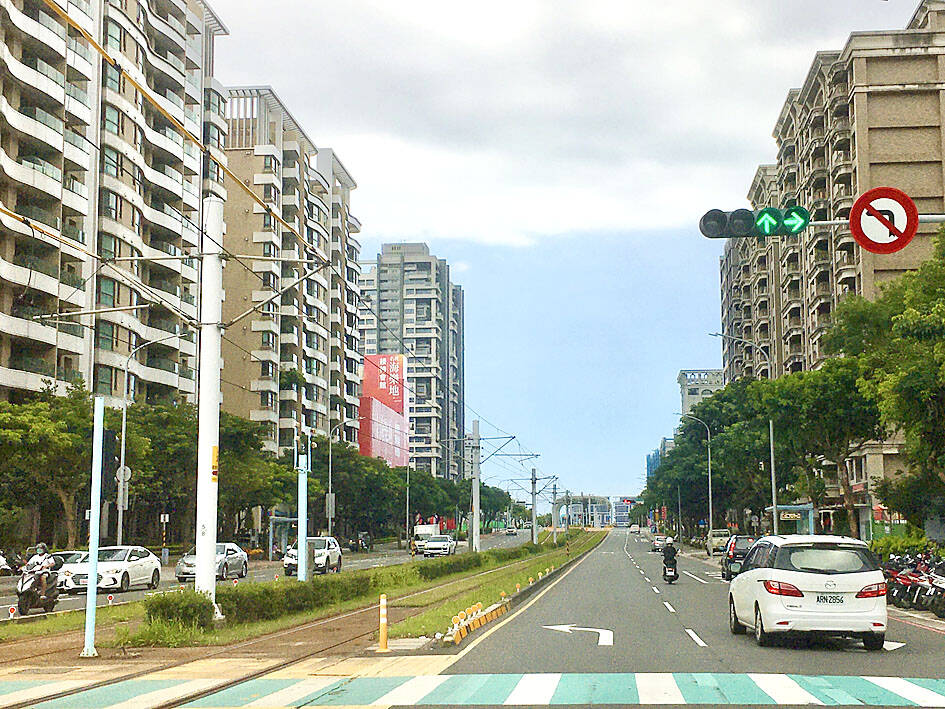The nation’s rent index last month climbed to a record 106.77, suggesting a pickup of 2.07 percent on average from a year earlier, Sinyi Realty Inc (信義房屋) said yesterday, citing government data.
The increase was fastest in southern Taiwan, with a 2.36 percent advance, followed by 2.1 percent in northern Taiwan, 1.92 percent in eastern Taiwan and 1.84 percent in central Taiwan, Sinyi said.
Tenants might feel the pinch more acutely than the readings have suggested, as the uptick added to the overall financial burden caused by COVID-19 restrictions weighing on economic activity and household incomes, Sinyi research manager Tseng Ching-der (曾敬德) said.

Photo: Hsu Yi-ping, Taipei Times
Rising property prices and wages in the past few years have helped drive up rent rates, while a stable housing supply also lent support, Tseng said.
The government has been offering rent subsidies to disadvantaged tenants to ease financial pressure, he said.
Although rents have continued to increase, they remain moderate compared with mortgage payments, Tseng said.
The phenomenon could cause people to prefer renting over buying, especially if the central bank raises interest rates on mortgages above 2 percent, he said.
An interest rate hike in December could lift interest rates to 2 percent, Tseng said, adding that landlords would most likely pass the extra financial burden on to tenants.

RUN IT BACK: A succesful first project working with hyperscalers to design chips encouraged MediaTek to start a second project, aiming to hit stride in 2028 MediaTek Inc (聯發科), the world’s biggest smartphone chip supplier, yesterday said it is engaging a second hyperscaler to help design artificial intelligence (AI) accelerators used in data centers following a similar project expected to generate revenue streams soon. The first AI accelerator project is to bring in US$1 billion revenue next year and several billion US dollars more in 2027, MediaTek chief executive officer Rick Tsai (蔡力行) told a virtual investor conference yesterday. The second AI accelerator project is expected to contribute to revenue beginning in 2028, Tsai said. MediaTek yesterday raised its revenue forecast for the global AI accelerator used

Taiwan Semiconductor Manufacturing Co (TSMC, 台積電) has secured three construction permits for its plan to build a state-of-the-art A14 wafer fab in Taichung, and is likely to start construction soon, the Central Taiwan Science Park Bureau said yesterday. Speaking with CNA, Wang Chun-chieh (王俊傑), deputy director general of the science park bureau, said the world’s largest contract chipmaker has received three construction permits — one to build a fab to roll out sophisticated chips, another to build a central utility plant to provide water and electricity for the facility and the other to build three office buildings. With the three permits, TSMC

TEMPORARY TRUCE: China has made concessions to ease rare earth trade controls, among others, while Washington holds fire on a 100% tariff on all Chinese goods China is effectively suspending implementation of additional export controls on rare earth metals and terminating investigations targeting US companies in the semiconductor supply chain, the White House announced. The White House on Saturday issued a fact sheet outlining some details of the trade pact agreed to earlier in the week by US President Donald Trump and Chinese President Xi Jinping (習近平) that aimed to ease tensions between the world’s two largest economies. Under the deal, China is to issue general licenses valid for exports of rare earths, gallium, germanium, antimony and graphite “for the benefit of US end users and their suppliers

Dutch chipmaker Nexperia BV’s China unit yesterday said that it had established sufficient inventories of finished goods and works-in-progress, and that its supply chain remained secure and stable after its parent halted wafer supplies. The Dutch company suspended supplies of wafers to its Chinese assembly plant a week ago, calling it “a direct consequence of the local management’s recent failure to comply with the agreed contractual payment terms,” Reuters reported on Friday last week. Its China unit called Nexperia’s suspension “unilateral” and “extremely irresponsible,” adding that the Dutch parent’s claim about contractual payment was “misleading and highly deceptive,” according to a statement